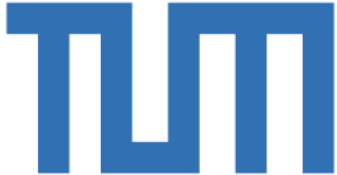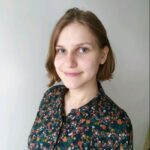Quantum computing (QC) offers a promising computational model that can potentially solve intractable problems by exploiting quantum phenomena such as entanglement and superposition. QC has important applications in cryptography, database search, chemistry simulations, portfolio optimization, machine learning, etc. Remarkable progress in engineering and materials science has created multiple quantum processing units (QPUs) featuring dozens to hundreds of qubits. These QPUs are typically offered by all major cloud providers: IBM, Microsoft Azure, AWS, etc.

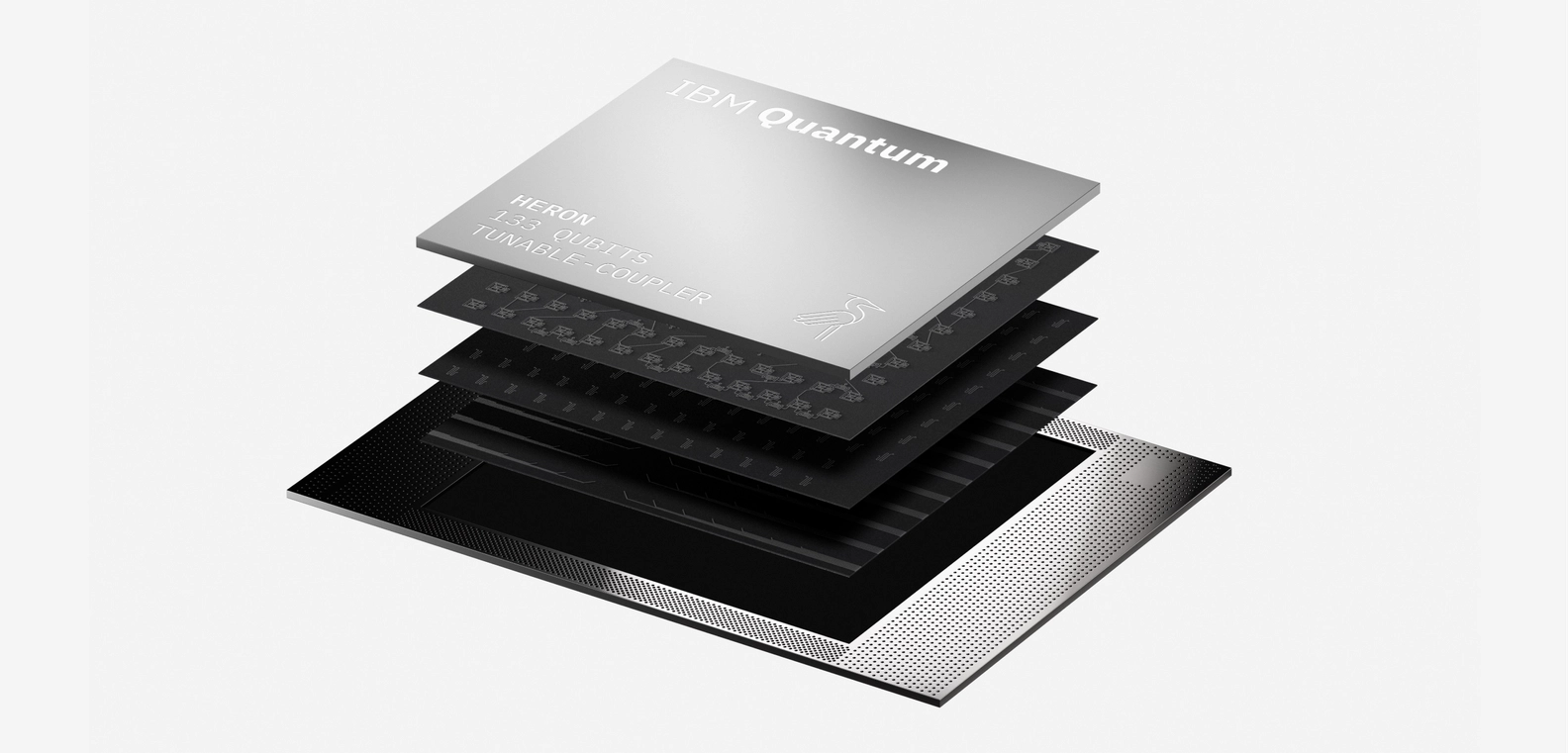
Left: The gold casing is a cryostat fridge that cools the QPU to almost absolute zero degrees. It is one of the coldest places in the universe.
Right: The actual QPU chip (similar size to a CPU chip).
However, QPUs face several significant challenges that limit their widespread adoption and efficiency. First, the size of QPUs, measured by the number of qubits, remains small, restricting the complexity of problems they can solve. Second, QPUs are highly sensitive to noise, leading to frequent errors during computations. Third, the quantum ecosystem is highly heterogeneous: various quantum technologies (e.g., superconducting qubits, trapped ions), architectures, and qubits themselves often exhibit uneven performance and error rates. This spatial diversity is compounded by temporal heterogeneity, as QPUs require frequent re-calibration to maintain their functionality. Finally, the lack of robust systems software—such as virtualization, compilers, and operating systems—hinders efficient management, programming, and scaling of quantum resources. These challenges collectively make it difficult to fully exploit the potential of quantum computing.
Our research group aims to design, implement, and make novel system software stacks that tackle these challenges to enable high-performance and scalable QC.
NOTE: We’re looking for students who want to write BSc/MSc theses or participate in Guided Research. If you are interested, please check the application instructions.
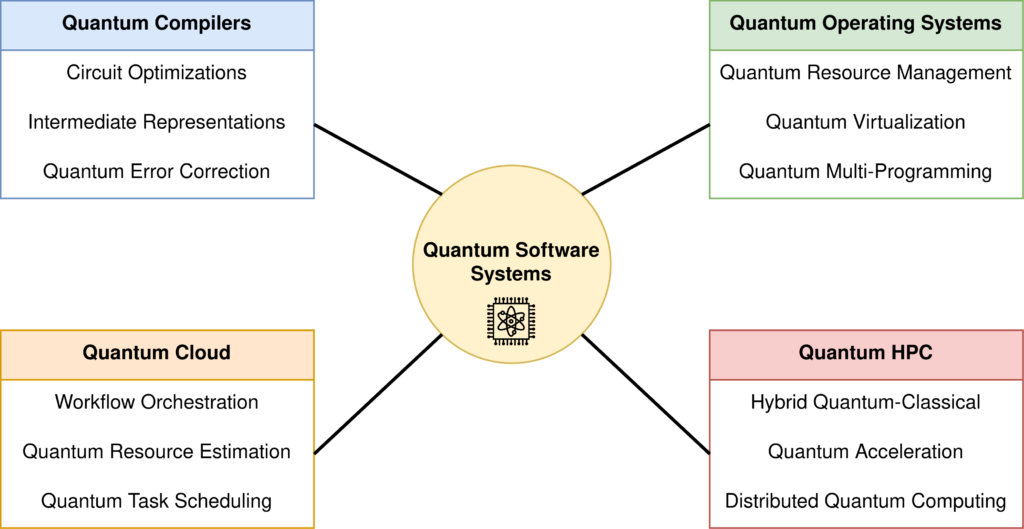
Current Active Projects
# Compiler for Mid-circuit Measurement Error Mitigation
Quantum computing promises to solve problems beyond the reach of classical computers, but today’s quantum devices are still prone to significant noise and errors. Among the key sources of errors are readout (measurement) errors, which occur when the quantum system is observed and its state is recorded. These become especially problematic in mid-circuit measurements—a technique where quantum bits (qubits) are measured partway through the computation, and the outcome is used to adapt subsequent operations. This process is central to advanced quantum algorithms, such as those involving conditional logic or error correction.
However, real quantum hardware can misreport measurement outcomes, which directly undermines the correctness of feed-forward operations (like conditionally applying a quantum gate based on the measurement result). While existing error mitigation techniques (like Readout Error Mitigation or Zero-Noise Extrapolation) work well at the end of the circuit, mid-circuit scenarios introduce new challenges.
This project focuses on developing and evaluating a software-based mitigation strategy for mid-circuit measurement errors, i.e., a compiler. It combines techniques from quantum error correction as well as compiler-level circuit transformations to simulate more robust decision-making within the circuit. Our approach applies multiple complementary mitigation methods in a stacked fashion, generating and managing alternate circuit instances to improve reliability without requiring changes to the physical hardware.
Keywords: Quantum Error Mitigation, Measurement Errors, Quantum Compilers
# Quantum Error Correction Benchmarking
Quantum error correction (QEC) is a vital technique for making quantum computers more reliable by correcting errors that occur during computation, which are caused by noise and imperfections in quantum devices. Since quantum systems are highly sensitive to errors, QEC helps improve the fidelity of quantum operations by encoding logical qubits in a way that allows for error detection and correction without directly measuring the qubits.
This project focuses on systematically benchmarking various quantum error correction codes (QECCs) to understand their performance in different scenarios. The pipeline developed for this benchmarking addresses several key questions, such as how QPU topology size and connectivity impact the effectiveness of QECCs in suppressing errors, how error probabilities vary across quantum devices, and how factors like qubit error rates, mapping, and translation to a backend’s basis set influence overall performance. Additionally, the project explores the challenges of executing QECCs on distributed quantum processing units (QPUs) and investigates how much error accumulation occurs during the error correction process itself. This work aims to comprehensively and fairly compare QECCs, contributing valuable insights into their practical application across different quantum technologies and devices.
Keywords: Quantum Error Correction, Benchmarking, Systematic Evaluation
# Multi-programming for Neutral Atoms Quantum Computers
Neutral atoms have become prominent hardware architecture for realizing quantum computers in recent years due to their long coherence times compared to other traditional candidates like superconducting quantum computers. They provide new features like qubit shutting, where specific qubits are temporarily removed from the computation to save resources, and atom swapping, allowing the exchange of qubits between atoms for better connectivity. They also support 3+ qubit gates, enabling more complex operations and parallel gate execution, which allows multiple gates to run simultaneously on different qubits.
This project explores multi-programming on Neutral Atom QPUs by leveraging a hardware-software co-design approach. In addition to optimizing how multiple quantum circuits are managed concurrently, we introduce a dedicated hardware controller that coordinates program execution, qubit resource allocation, and inter-program isolation in real-time. The co-designed controller interacts with the quantum runtime system to exploit hardware features such as atom swapping and parallel gate execution efficiently, thereby reducing overhead and improving overall system throughput. By bridging the abstraction gap between compiler/runtime software and physical QPU capabilities, this project aims to demonstrate how coordinated H/W-S/W design can scale quantum workloads more effectively and mitigate the challenges of concurrent quantum execution.
Keywords: Neutral Atoms, Multi-programming, Compilation, Hardware-Software Co-design
Past Projects
# QVM: Quantum Virtual Machine
Quantum computers promise breakthroughs in optimization, factorization, and quantum simulation but are hindered by noise and state decoherence, limiting the size and fidelity of quantum programs. Gate virtualization (GV) addresses these issues by replacing binary qubit gates with sampled single-qubit operations, improving circuit scalability and fidelity. However, existing GV methods lack automation and efficiency, suffering from high computational overhead.
To overcome these limitations, we propose the Quantum Gate Virtualization Machine (QVM), a system designed for scalable, reliable execution of quantum circuits on small, noisy QPUs. QVM comprises an abstraction for managing virtual gates, circuit decompositions, and data structures to streamline GV, a modular pipeline for optimizing circuits with GV, and A scalable execution framework that manages distributed QPU resources, processes virtual circuits, and leverages parallel post-processing.
Keywords: Virtualization, Quantum Optimization, Compiler, Intermediate Representation
Publication: https://arxiv.org/abs/2406.18410
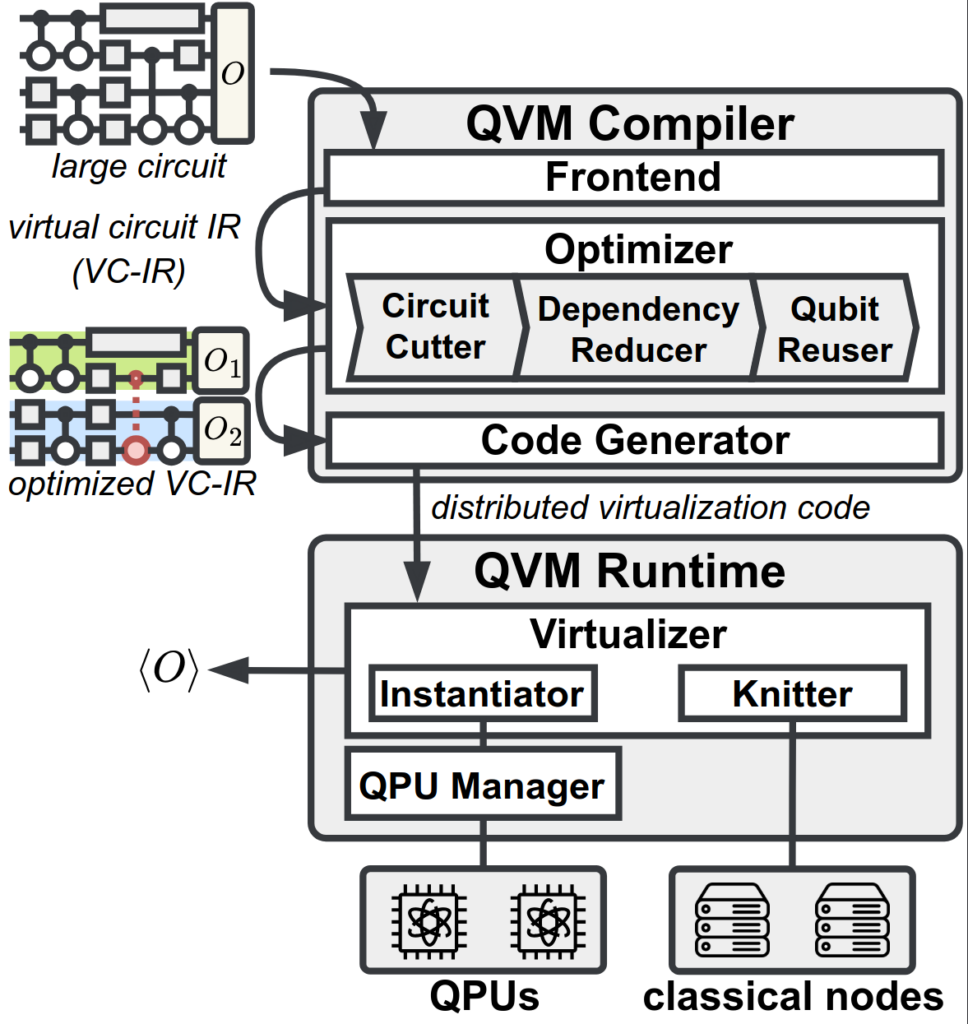
# QOS: Quantum Operating System
QPUs present unique challenges, such as inherent noise, limited capacity, unpredictable behavior, and interference during multi-programming. Current quantum cloud software is rudimentary, addressing these issues in isolation, which prevents a cohesive solution.
QOS is a unified system stack designed to tackle these challenges holistically. It combines compiler and runtime mechanisms to optimize quantum computation and resource management, meeting the goals of both users (high-quality computation, low waiting times) and operators (efficiency, scalability). Key components include: (1) The Qernel Abstraction: A shared structure supporting policies across the system. (2) Error Mitigator: Enhances execution quality through program optimization and result post-processing. (3) Estimator: Predicts the performance of a quantum circuit on a QPU without executing it. (4) Multi-programmer: co-schedules circuits together to improve QPU utilization. (5) Scheduler: schedules circuits in space and time (on which QPU and when they are going to be executed) to reduce latency with minimal quantum performance impact. By unifying these mechanisms into a cohesive system, QOS provides a scalable, high-performance framework for practical quantum computing in the cloud.
Keywords: Quantum Resource Management, Multi-programming, Scheduling
Publication: https://arxiv.org/abs/2406.19120
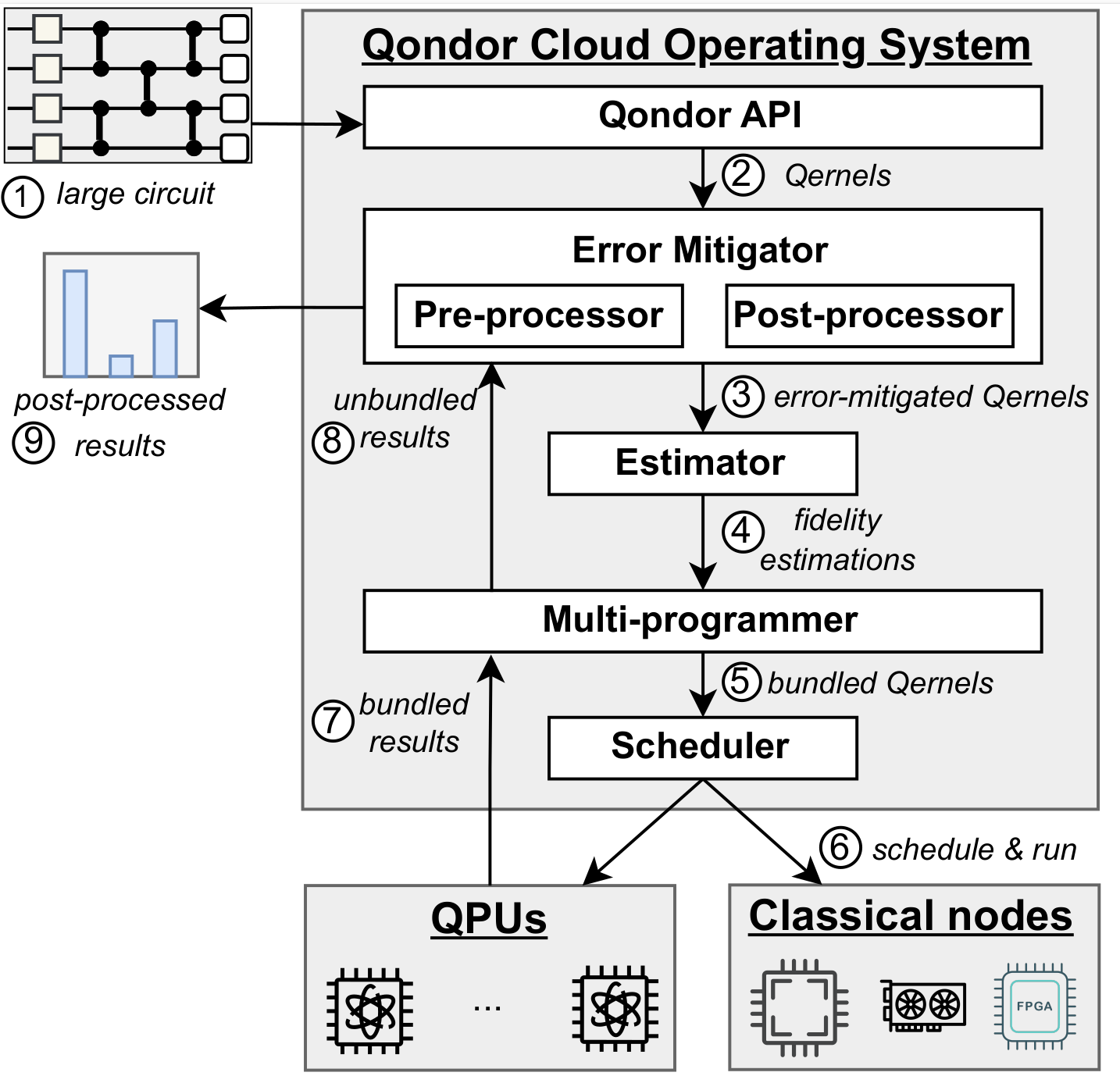
# Orchestrating Quantum Cloud Environments with Qonductor
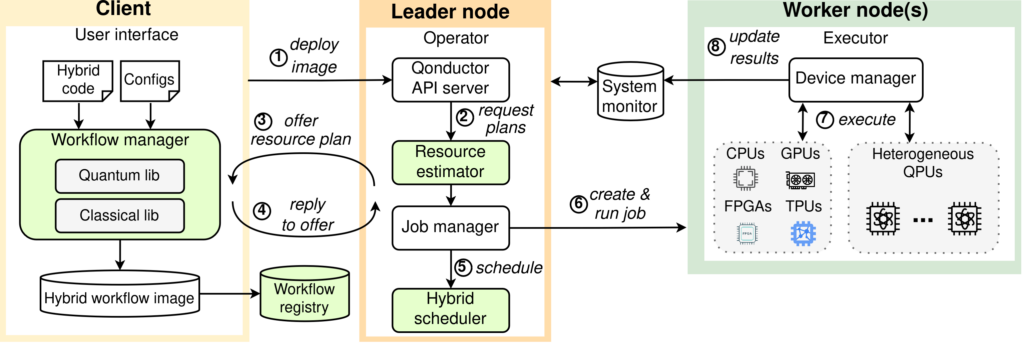
Quantum computing promises to solve problems beyond the reach of classical systems, but current Quantum Processing Units (QPUs) are specialized, noisy, and require hybrid workflows combining quantum and classical computing. These workflows rely heavily on classical pre- and post-processing steps to correct errors, often using accelerators like GPUs. The quantum cloud landscape adds further complexity, with scarce and highly varied QPUs, and increasing demand creating challenges in resource management and performance optimization.
Qonductor is a cloud-based orchestration system for hybrid quantum-classical workloads. Qonductor simplifies hybrid application development through standardized APIs, optimizes resource use with a resource estimator, and employs a scheduler to balance execution fidelity and job completion times. By addressing inefficiencies in hybrid workflows and resource allocation, Qonductor enhances performance and usability for quantum cloud applications.
Keywords: Quantum-Classical Resource Management, Estimation, HPC and Cloud
Publication: https://arxiv.org/abs/2408.04312
# Weaver: A Retargetable Compiler Framework for FPQA Quantum Architectures

Modern quantum processors, primarily based on superconducting technologies but also including emerging alternatives like trapped ions, neutral atoms, and photonics, are mostly accessed via cloud platforms. These technologies present trade-offs in performance, manufacturing complexity, and operational requirements, such as coherence times, gate speeds, error rates, and cooling needs. To leverage the diverse strengths of these platforms, retargetable quantum compilers are essential for adapting quantum programs seamlessly across hardware without requiring algorithm redesigns.
To address challenges in extensibility, performance, and verifiability, we propose Weaver as the first retargetable quantum compiler framework designed for superconducting qubits and neutral atom technologies, particularly Field-Programmable-Quantum-Arrays (FPQAs). Weaver extends OpenQASM with FPQA-specific instructions, optimizes programs for parallelism and reduced execution time through wOptimizer, and ensures functional equivalence via wChecker, advancing scalable and high-fidelity quantum computing.
Keywords: Retargetable Compiler, Neutral Atoms, ISA extension, Equivalence Checking
Publication: https://dl.acm.org/doi/10.1145/3696443.3708965
# Quantum Tensor Processor Unit (qTPU)
Quantum computing has the potential to revolutionize certain types of computations, but current quantum processors face significant challenges due to noise and limited scalability. To address these issues, researchers are exploring hybrid approaches that combine quantum and classical resources, such as quantum circuit knitting, which breaks down large quantum tasks into smaller, more manageable pieces. However, existing methods are often inefficient, with high computational overheads in the classical postprocessing phase.
qTPU is a framework designed to make hybrid quantum-classical computing more scalable and efficient. By leveraging advanced techniques like tensor networks and specialized compilers, qTPU reduces overhead, optimizes circuit decomposition, and accelerates processing across clusters of quantum and classical resources. The framework aims to achieve better performance than classical simulators while mitigating errors from quantum hardware.
Keywords: Tensor networks, Hybrid Tensors, Quantum-Classical, Compilation
Publication: https://arxiv.org/abs/2410.15080
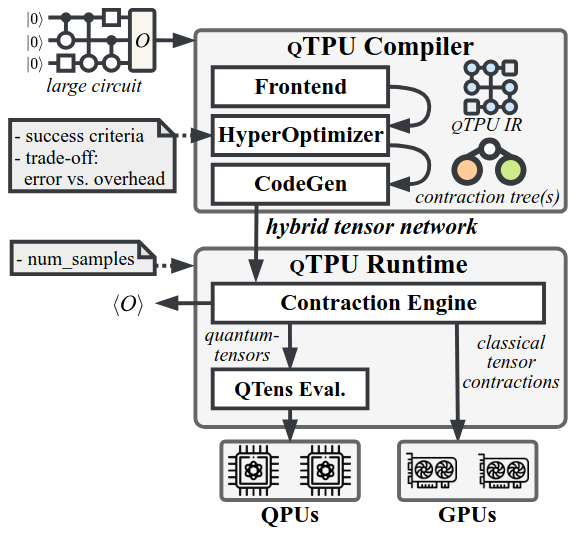
Group Members
Related Teaching
| SoSe 2025 | Seminar | Quantum Software Systems |
| WiSe 24/25 | Seminar | Quantum Software Systems |
| SoSe 2024 | Seminar | Quantum Software Systems |
| SoSe 2023 | Seminar | Quantum Software Systems |
